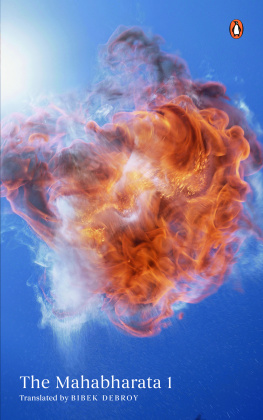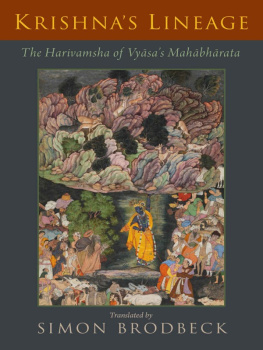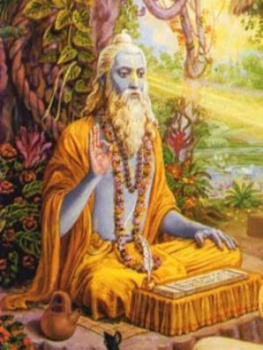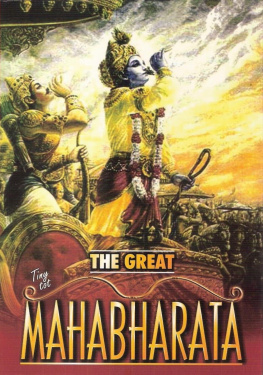B ibek Debroy is a renowned economist, scholar and translator. He has worked in universities, research institutes, industry and for the government. He has widely published books, papers and articles on economics. As a translator, he is best known for his magnificent rendition of the Mahabharata in ten volumes, published to wide acclaim by Penguin Books India. He is also the author of Sarama and Her Children, which splices his interest in Hinduism with his love for dogs.
Praise for the Mahabharata
The modernization of language is visible, its easier on the mind, through expressions that are somewhat familiar. The detailing of the story is intact, the varying tempo maintained, with no deviations from the original. The short introduction reflects a brilliant mind. For those who passionately love the Mahabharata and want to explore it to its depths, Debroys translation offers great promise in the first volume.
Hindustan Times
[Debroy] has really carved out a niche for himself in crafting and presenting a translation of the Mahabharata... The book takes us on a great journey with admirable ease.
The Indian Express
The first thing that appeals to one is the simplicity with which Debroy has been able to express himself and infuse the right kind of meanings... Considering that Sanskrit is not the simplest of languages to translate a text from, Debroy exhibits his deep understanding and appreciation of the medium.
The Hindu
Overwhelmingly impressive... Bibek is a truly eclectic scholar.
Business Line
Debroys lucid and nuanced retelling of the original makes the masterpiece even more enjoyably accessible.
Open
The quality of translation is excellent. The lucid language makes it a pleasure to read the various stories, digressions and parables.
The Tribune
Extremely well-organized, and has a substantial and helpful Introduction, plot summaries and notes. The volume is a beautiful example of a well thought-out layout which makes for much easier reading.
The Book Review
The dispassionate vision [Debroy] brings to this endeavour will surely earn him merit in the three worlds.
Mail Today
This [second] volume, as voluminous as the first one, is expectedly as scholarly... Like the earlier volume, the whole book is an easy read.
The Hindu
Debroys is not the only English translation available in the market, but where he scores and others fail is that his is the closest rendering of the original text in modern English without unduly complicating the readers understanding of the epic.
Business Standard
The brilliance of Ved Vysya comes through [in Volume 3], ably translated by Bibek Debroy.
Hindustan Times
For Prakash Javadekar
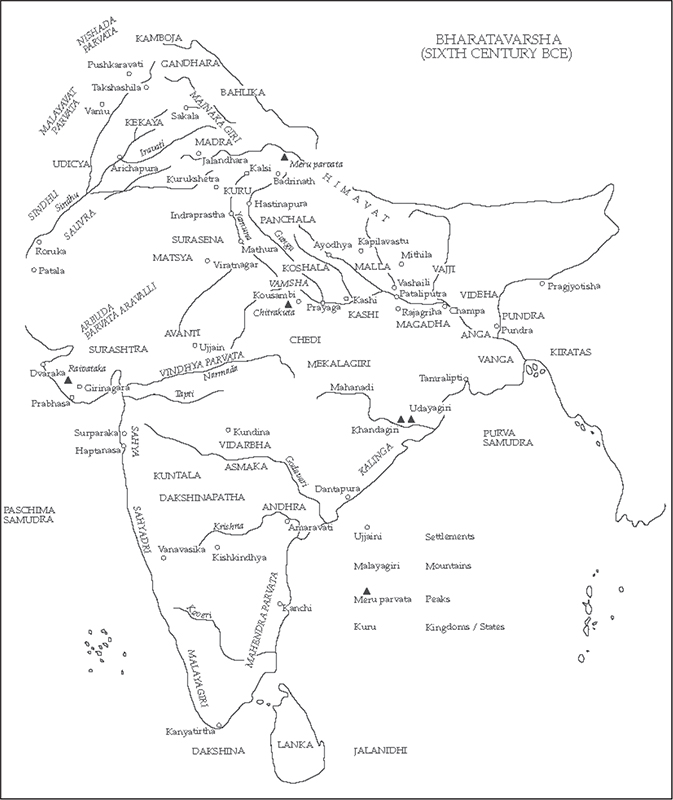
Introduction
T he Harivamsha is not a Purana, though it is often loosely referred to as a Purana. The word Purana means ancient and, as texts, the Puranas are ancient accounts. There are many texts that are referred to as Puranas. To be classified as a proper Purana, a text needs to cover five topics: (1) sarga, the original creation; (2) pratisarga, the periodic cycles of secondary creation and destruction; (3) vamsha, the genealogies of the gods and the rishis; (4) manvantara, the eras, each presided over by a Manu; and (5) the solar and lunar dynasties. In lists of the Puranas, there are the great Puranas, the Mahapuranas, and the minor Puranas, the Upapuranas. There is no consensus on what counts as Upapurana and what does not. Lists vary from one part of the country to another. However, there is consensus on the list of Mahapuranas. There are eighteen of these and their names are; (1) Agni Purana; (2) Bhagavata Purana; (3) Brahma Purana; (4) Brahmanda Purana; (5) Brahmavaivarta Purana; (6) Garuda Purana; (7) Kurma Purana; (8) Linga Purana; (9) Markandeya Purana; (10) Matsya Purana; (11) Narada Purana; (12) Padma Purana; (13) Shiva Purana; (14) Skanda Purana; (15) Vamana Purana; (16) Varaha Purana; (17) Vayu Purana; and (18) Vishnu Purana. In some cases, the Bhavishya Purana is included in the list of eighteen. When that is done, either the Shiva Purana or the Vayu Purana is included in the list, but not both. In greater or lesser degree, all the Mahapuranas satisfy those five characteristics, the Vishnu Purana more than the others.
The Mahabharata was composed by the sage Krishna Dvaipayana Vedavyasa. There were many regional versions of this Sanskrit text. Between 1919 and 1966, the Bhandarkar Oriental Research Institute in Pune sifted through these various versions and brought out a Critical Edition of this Sanskrit text. Since unabridged translations of the Mahabharata in English are rare, a translation was published by Penguin Books India between 2010 and 2014 and a boxed set has been brought out in 2015.
The pattern followed in this Harivamsha translation also follows that of the Mahabharata translation. The intention is to make the translation as close to the original Sanskrit text as is possible. In the process, the English is not always as smooth as might have been the case had one taken more liberties. If a reader has the Sanskrit in front, there will be an exact correspondence between the Sanskrit and the English. This cannot be achieved with a verse translation, though the Harivamsha is in verse. Hence, the translation is in prose. Some words cannot satisfactorily be translated, dharma being a case in point. Therefore, such words are not translated. This is a translation, it isnt an interpretation. However, a straightforward translation may not make everything clear to the reader. This explanation is done through footnotes and should be sufficient to explain the text. Because this translation is meant to be accessible to the ordinary reader, there was a conscious decision to avoid diacritical marks. Names, proper names and geographical names, are therefore rendered as close phonetically as is possible. The absence of diacritical marks sometimes can cause confusion, such as between Vasudeva (Krishna) and Vasudeva (Krishnas father). When there is a danger of confusion, not obvious from the context, this has been avoided by rendering Krishna as Vaasudeva and Krishnas father as Vasudeva.
What is the Harivamsha about? In a general sense, it is about Krishnas life. When we first encounter Krishna in the Mahabharata, he is already an adult. Where was he born? What were his childhood and other exploits, those not recounted in the Mahabharata? The Harivamsha answers such questions. But such questions are also answered in the Puranas, at least some of them. The belief is that after composing the Mahabharata, Vedavyasa composed the Puranas. The Mahabharata is believed to have had 100,000


